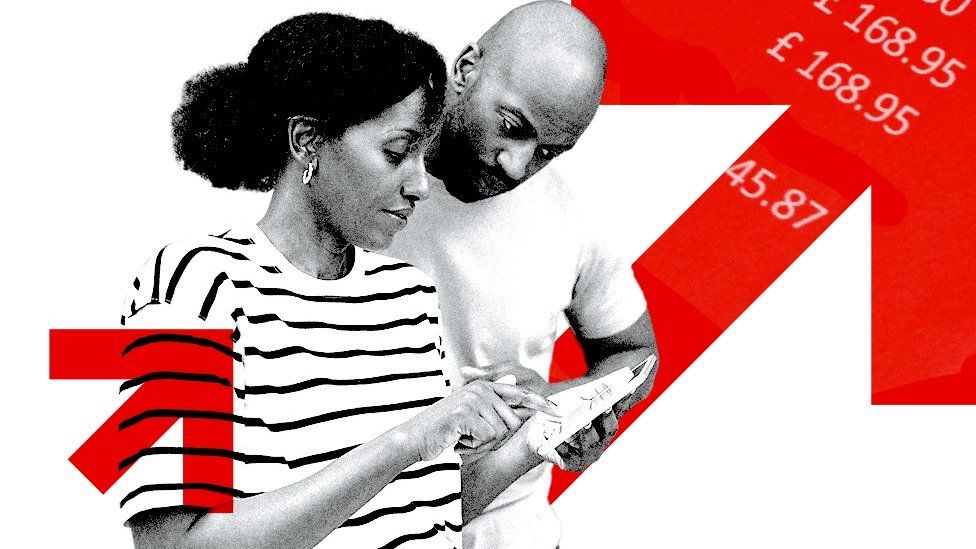Energy bills: What can I do if I can't afford to pay?
- Published
- comments

Energy prices have fallen from 1 April, but many households will still struggle to pay their bills.
Some will need to repay debt to suppliers and many will worry about future levels of financial support.
What is happening to energy bills?
From April, energy bills fell by more than 12% for most people in England, Scotland and Wales.
Energy regulator Ofgem announced the average household paying for dual fuel by direct debit would nowpay £1,690 a year.
That's a drop of £238 (or about £20 a month) from the previous energy price cap - the maximum amount suppliers can charge for each unit of gas and electricity used.
It's the lowest level in more than two years, a period when energy prices soared due to Russia's invasion of Ukraine.
How many people can't pay their energy bills?
About 5.3m people in Great Britain are in debt to their energy supplier, research by Citizens Advice suggests.
The charity says 1.7m people lost connection at least once a month in 2023 because they couldn't afford to top up their prepayment meter.
Its survey found that 800,000 people went more than 24 hours without gas and electricity because they couldn't afford to top up.
It estimated that 2m people would lose their power supply for the same reason between January and March 2024.
What happens if you don't pay your bill?
Under Ofgem rules, your supplier must work with you to agree a payment plan.
If you don't agree one, they might try to force you to have prepayment meter installed or switch an existing smart meter to prepayment mode.
In very rare cases, if you haven't paid a bill after 28 days, you might be threatened with disconnection.
If you've reached state pension age, your supplier can't disconnect you between 1 October and 31 March if you either:
- live alone
- live only with pensioners, or under-18s
Suppliers can pass your details to a debt collection agency - and you might be charged more to cover the cost of this.
Many suppliers also charge extra fees for late payments.
Non-payment could also damage your credit rating and make it harder to borrow money in the future.
Can I be forced to have a prepayment meter?
Suppliers can install a prepayment meter without a household's permission - but only if they meet certain requirements.
These were brought in after an investigation by The Times found debt agents acting for British Gas wrongly broke into vulnerable people's homes to fit meters.
The rules mean suppliers must give customers more opportunity to clear their debts, contacting them at least 10 times before installing a meter. They also have to conduct a "site welfare visit".
Meters cannot be fitted for:
- customers over 75, without someone else in the home, or anyone with a terminal illness
- people with health conditions that could be worsened by a cold home
- those with children under the age of two
- those who need a continuous energy supply for health reasons
- households where no-one can top up the meter due to physical or mental incapacity
About four million households had a prepayment meter in July 2023, according to Ofgem.
Prepayment meters used to be more expensive than paying by direct debit but the charges are now the same.
What should you do if you can't afford your energy bills?
If you are struggling to pay your energy bills, you need to contact your supplier.
You can ask for a review of your payments and debt repayments, payment breaks or reductions, more time to pay and access to hardship funds.
If eligible you could be added to a list of households entitled to extra support, the Priority Services Register.
It doesn't cancel your debts but it does show that you are vulnerable, which your supplier should take into account.
Ofgem also recommends asking your supplier to add you to the Network Operator Register, if you rely on energy for medical reasons.
Make sure you are claiming relevant benefits and government help. You can check the MoneyHelper benefits guide or use the Entitledto and Turn2us benefits calculators.
Pensioners, people on certain disability benefits, and households on means-tested benefits, can get help with energy bills.
Councils can offer help through the Household Support Fund, which has been extended for six months from March 2024.
Finally, adjusting settings on your boiler can save money.